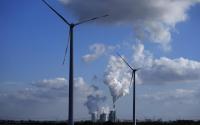11 June 2008
The most obvious lesson to be learned from the Senate's failure to mount any sort of grown-up debate on climate change last week is that the country needs a new occupant in the White House.
By that we mean a president who not only understands and cares deeply about the issue — which both Senators Barack Obama and John McCain say they do, and which President Bush clearly does not — but who is willing to invest the time and the political capital necessary to push good legislation through Congress.
The bill sought to reduce American emissions of carbon dioxide and other greenhouse gases by nearly 70 percent by 2050, short of what most climate scientists believe is necessary but an important first step.
The Senate majority leader, Harry Reid, trumpeted climate change as "the most important issue facing the world today," and all of the players insisted they understood the stakes. Yet after three-and-one-half days of unhelpful partisan sniping, the Democratic leadership pulled the bill from the floor when only 48 senators voted to prevent a threatened Republican filibuster.
There was blame enough to go around. Republicans and some Democrats complained — not without reason — that the bill's manager, Barbara Boxer, had spent too little time in preliminary hearings discussing its potential economic impact. She also confused matters by adding last-minute amendments, including one aimed at reducing the federal deficit, that seemed to have little to do with the issue at hand.
The timing was terrible. A bill that would inevitably raise energy prices did not sit well with senators dealing with record gasoline prices. And a Republican leadership more interested in protecting industry than the environment behaved like babies, at one point spitefully forcing a complete reading of the 492-page bill, sapping any political momentum.
Ms. Boxer and the environmental community still tried for a positive spin, noting that 54 senators altogether — including six absentees who wrote letters expressing support — favored the bill, a substantial increase over the 38 senators who supported a less-aggressive measure in 2005.
Yet of those 54, about 10 — among them liberal, rust-belt senators — said they would not have actually voted for the bill unless it was amended to provide more help to industries (and their workers) that would bear the heaviest burden of reducing emissions.
There are other fault lines. One huge issue that was not even addressed in last week's truncated discussion is what to do with the enormous sums of money likely to be raised by selling emission quotas to industry. Some senators would invest most of that money in clean technologies — wind, solar, even nuclear power — and in a new generation of coal-fired plants that could capture and store carbon emissions. Others would return a sizable share of the proceeds to consumers to help ease the pain of higher energy bills.
No one ever said that dealing with climate change would be easy or cost-free. But we expected better from the Senate. We hope the next president will have the necessary conviction and stamina — and a real sense of urgency. Too much time has been wasted.
http://www.nytimes.com/2008/06/11/opinion/11wed1.html?_r=2&ref=opinion&oref=slogin&oref=slogin






